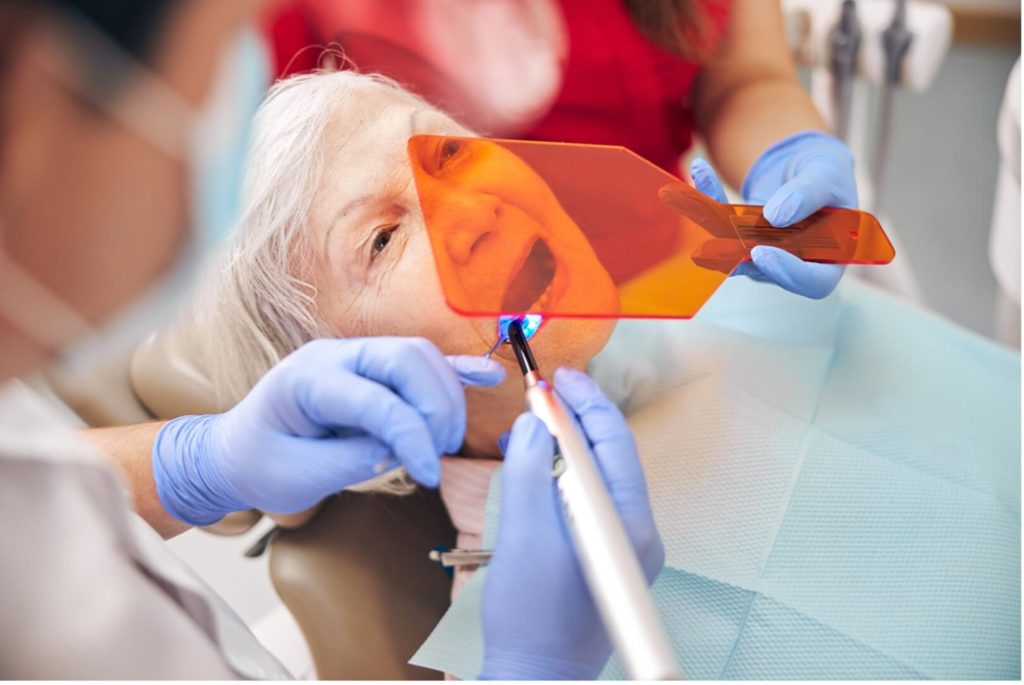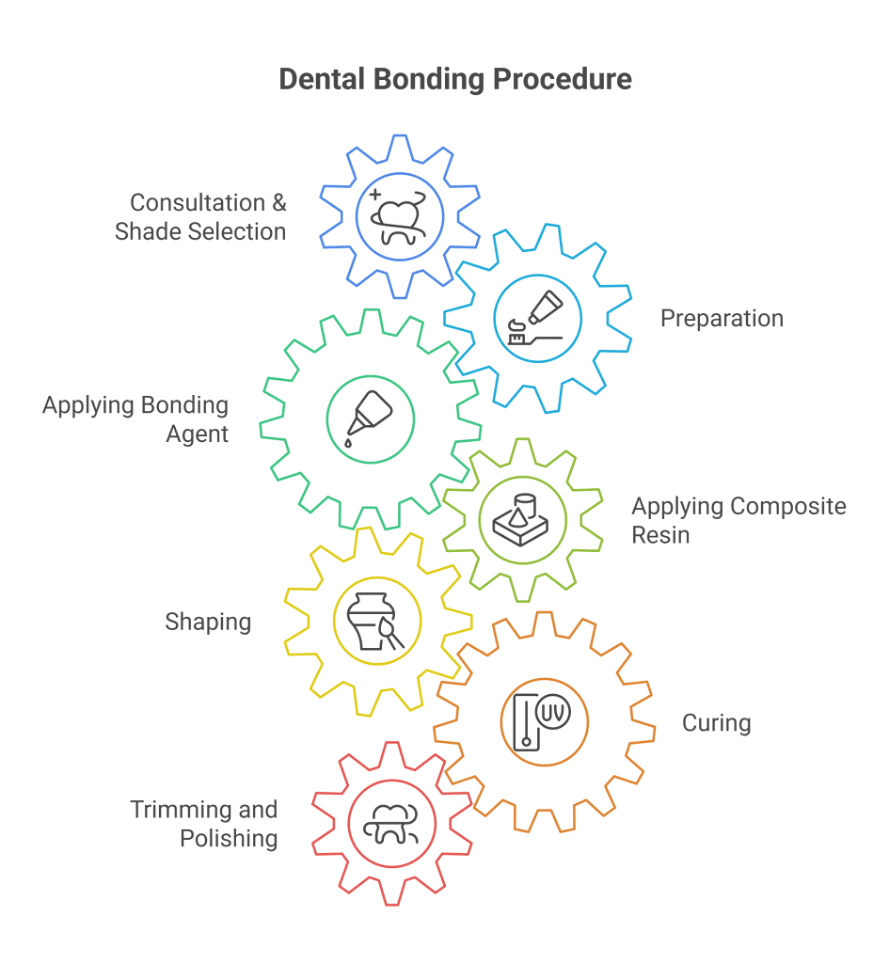Minor imperfections in your smile, like a small chip or a gap between teeth, can make you feel self-conscious. While there are many cosmetic dental options available, some involve lengthy procedures or significant costs. But what if there was a fast, effective, and relatively affordable way to address these issues right here in Markham? Cosmetic dental bonding could be the quick fix you’re looking for. It’s a popular procedure known for its versatility and speed, making it an excellent option for correcting minor cosmetic flaws in just one visit.
In this guide, we’ll take a detailed look at cosmetic dental bonding – how it works, what it can fix (especially chipped teeth!), its benefits, limitations, and what you can expect regarding cost and care in Markham.
What is Cosmetic Dental Bonding?
Cosmetic dental bonding is a procedure where a tooth-coloured composite resin material is applied to a tooth, molded into shape, and then hardened with a special light.
This process “bonds” the material to the tooth, restoring its appearance and function.
Think of the composite resin like a pliable putty that can be sculpted by your dentist to seamlessly blend with your natural tooth structure.
It’s a straightforward technique that offers significant aesthetic improvements for minor dental issues.
What Imperfections Can Dental Bonding Fix?
Cosmetic bonding is incredibly versatile and can address a variety of dental concerns. It’s particularly effective as a quick solution for:

- Fixing Chipped or Cracked Teeth: This is one of the most common uses for dental bonding. Whether it’s a small chip from biting something hard or a hairline crack, bonding can effectively repair the damaged area, restoring the tooth’s original shape and preventing further damage. The composite resin is carefully matched to your tooth colour and molded to fill in the chip, making the tooth look whole again.
- Closing Small Gaps Between Teeth: Bonding can be used to widen teeth slightly, closing minor spaces without the need for orthodontics.
- Improving the Appearance of Discolored Teeth: While professional whitening is often the first step for stained teeth, bonding can cover persistent discoloration or uneven colour spots that don’t respond to bleaching.
- Changing the Shape or Length of Teeth: Bonding can reshape irregularly shaped teeth or make short teeth appear longer for a more uniform smile.
- Protecting Exposed Tooth Roots: Gum recession can expose tooth roots, causing sensitivity. Bonding material can be applied to cover and protect these exposed surfaces.
For many people in Markham, especially those dealing with a recently chipped tooth, bonding offers an immediate and non-invasive way to get their smile back on track.
The Dental Bonding Procedure: Step-by-Step
One of the most appealing aspects of dental bonding is how quick and simple the process is. It typically takes between 30 to 60 minutes per tooth and can often be completed in a single visit.

Here’s what usually happens:
- Consultation & Shade Selection: Your dentist will examine your tooth/teeth, discuss your goals, and determine if bonding is the right option for you. They will then use a shade guide to select a composite resin colour that perfectly matches your natural teeth.
- Preparation: The surface of the tooth is lightly prepared. This might involve slightly roughening the enamel or using a mild etching solution to help the bonding material adhere effectively. Anesthesia is often not necessary unless the bonding is being used to fill a cavity or the chip is near a nerve.
- Applying the Bonding Agent: A liquid bonding agent is applied to the prepared tooth surface.
- Applying the Composite Resin: The tooth-coloured composite resin material is applied over the bonding agent.
- Shaping: Your dentist expertly molds and shapes the resin before it hardens to achieve the desired appearance, carefully sculpting it to match the contours of your natural tooth.
- Curing: A special ultraviolet (UV) light or laser is used to rapidly harden or “cure” the resin material.
- Trimming and Polishing: Once the material is hardened, your dentist will further trim, shape, and polish it until it looks natural and feels smooth, just like your other teeth.
The result is a beautifully restored tooth that seamlessly integrates into your smile.
Advantages of Choosing Dental Bonding
Compared to other cosmetic procedures, dental bonding offers several compelling benefits:
- Speed: Most bonding procedures are completed in one visit, making it a truly “quick fix”.
- Minimally Invasive: Unlike veneers or crowns, bonding requires minimal removal of tooth enamel, preserving more of your natural tooth structure.
- Versatility: It can address a wide range of minor cosmetic and restorative issues.
- Cost-Effective: Bonding is generally less expensive than alternatives like dental veneers or crowns.
- No Anesthesia Needed: In many cases, especially for minor repairs, the procedure is painless enough that anesthesia isn’t required.
For patients in Markham looking for an efficient and gentle way to improve their smile, bonding is an excellent choice.
Limitations and Considerations
While dental bonding is a fantastic solution for many, it’s important to be aware of its limitations:
- Durability: Composite resin is strong, but it’s not as durable or resistant to wear as the material used for crowns or veneers. It can chip, fracture, or wear down over time.
- Staining: The composite resin material is more susceptible to staining from coffee, tea, wine, and smoking than natural tooth enamel or porcelain veneers.
- Longevity: Bonding typically lasts between 3 to 10 years before needing repair or replacement, whereas veneers and crowns can last much longer with proper care.
- Scope: Bonding is best suited for minor cosmetic issues and small areas of decay or damage. For more extensive problems, other restorative options may be more appropriate.
Your Markham dentist can help you weigh the pros and cons based on your specific needs and desired outcome.
Dental Bonding Cost in Markham
Cost is a significant factor for many patients considering cosmetic procedures. The cost of cosmetic dental bonding in Markham, like elsewhere in Ontario, can vary depending on several factors.
Generally, the cost ranges from $200 to $600+ per tooth without insurance.
Factors that influence the final cost include:
- Complexity of the Procedure: Repairing a small chip is less complex (and usually less expensive) than reshaping an entire tooth or closing a large gap.
- Number of Teeth Being Bonded: The total cost will increase with each additional tooth treated.
- Location and Dentist’s Experience: Costs can vary slightly between practices and dentists.
- Materials Used: While the base material is composite resin, variations in quality can exist.
Insurance Coverage:
Many dental insurance plans in Canada offer some coverage for dental bonding, especially when it’s performed for restorative purposes (like repairing a chipped tooth or filling a cavity).

Cosmetic-only bonding might have less coverage. It’s essential to check with your specific insurance provider about your plan’s details.
You may require a pre-authorization for the treatment. With typical insurance coverage, your out-of-pocket cost could range from $60 to $120 per tooth.
Your dental office in Markham can provide a precise quote after a consultation and help you understand your insurance benefits.
Caring for Your Bonded Teeth: Maintenance Tips
To help your bonded teeth last as long as possible and keep them looking their best, with proper care, you can maximize the lifespan of your dental bonding.
Follow these simple maintenance tips:
- Practice Excellent Oral Hygiene: Brush at least twice a day and floss daily to keep your teeth and gums healthy.
- Avoid Biting Hard Objects: Don’t bite down on hard candies, ice, pens, or fingernails, as this can chip or break the bonding material.
- Be Mindful of Staining Substances: Limit your consumption of coffee, tea, red wine, and other foods/drinks known to cause staining, especially in the first 48 hours after bonding. If you do consume them, rinse your mouth with water afterward.
- Don’t Use Your Teeth as Tools: Avoid using your teeth to open packages or tear things.
- Consider a Night Guard: If you grind or clench your teeth at night (bruxism), a custom night guard can protect your bonded teeth from excessive wear and chipping.
- Schedule Regular Dental Check-ups: Visit your dentist in Markham routinely for professional cleanings and examinations. Your dentist can check the condition of the bonding and polish it if necessary.
How Long Does Dental Bonding Last?
The lifespan of dental bonding varies depending on the location of the bonding, your oral hygiene habits, your diet, and whether you grind your teeth.
On average, cosmetic dental bonding lasts between 3 to 10 years.
Repair or replacement may be needed if the bonding chips, cracks, wears down, or becomes significantly stained.
Regular check-ups allow your dentist to monitor the bonding and recommend maintenance or replacement when needed.
Is Dental Bonding Right for You? Getting Treatment in Markham
If you have minor cosmetic concerns like a chipped tooth, small gaps, or discoloration and are looking for a fast, effective, and relatively affordable solution, dental bonding is definitely worth considering.
It’s a fantastic option for quick aesthetic improvements with minimal discomfort and time commitment.
Choosing a local dental practice in Markham ensures convenience for follow-up appointments and regular maintenance.
Experienced dentists can assess whether bonding is the best approach for your specific situation or if an alternative treatment like veneers or crowns might offer a longer-lasting or more comprehensive solution for your goals.
Enhance Your Smile with Dental Bonding in Markham
Don’t let minor dental imperfections keep you from smiling confidently. Cosmetic dental bonding offers a quick, non-invasive, and effective way to restore the beauty of your teeth, whether you need to fix a chipped tooth, close a small gap, or improve shape. If you’re in Markham and curious about how dental bonding could transform your smile, the best step is to consult with a local dental professional.
They can assess your needs, discuss your options, and help you determine if dental bonding is the right solution for you.
Frequently Asked Questions (FAQ)
Q: How much does dental bonding cost per tooth in Markham?
A: The cost per tooth typically ranges from $200 to $600+ without insurance in Ontario. Factors like complexity and the number of teeth treated affect the price.
Q: Does dental bonding fix chipped teeth permanently?
A: No, dental bonding is not permanent. It is durable and effective for fixing chips, but the material can wear down or chip over time. It typically lasts between 3 to 10 years before potentially needing repair or replacement.
Q: Is dental bonding covered by insurance in Canada?
A: Many Canadian dental insurance plans provide coverage for dental bonding, especially when it’s used for restorative purposes like repairing a chipped tooth. Coverage for purely cosmetic bonding may be limited. Check with your specific insurance provider for details.
Q: Is the dental bonding procedure painful?
A: Dental bonding is generally not painful. Anesthesia is often not required unless the bonding is near a nerve or used to fill a cavity. Patients typically experience little to no discomfort during the procedure.
Q: How long does it take to get dental bonding?
A: The procedure usually takes about 30 to 60 minutes per tooth and can often be completed in a single dental visit.


